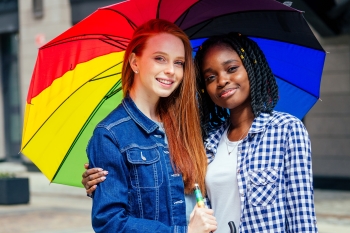
Finding Social Support as a Queer Teenager
Community support is a key factor in managing stress. A community can be anything you make it- a few friends from school, trusted family members, or extracurricular group members. Anywhere you feel safe and accepted counts as your community. In times of great stress, members of our communities can provide us a sense of security that we may not be getting from other environments. By having access to social support as a queer teenager, you can remind yourself that you are worthy of care, love, and attention.
If you’re not sure what you’re community is, ask yourself these questions:
Who do I trust?
Who will listen to me without judgment?
Who makes me feel safe?
Who might have gone through what I’m going through now?
Whether it's one person or fifty- our community members can show up for us when we feel overwhelmed. As members of the queer community, it can be important to find people that can understand your specific journey as you explore your own sexuality and gender identity. After asking yourself these questions, where do you start your search for community? There are many ways to reach out to support systems such as:
Calling/texting/video chatting.
Participating in extracurricular activities.
Attending support groups.
Seeking professional support.
Where to begin looking for support
If you’re at a loss of where to look for social support as a queer teenager, try beginning with these resources:
School and Educational resources. Many schools now have LGBTQ+ clubs or GSA (Gender-Sexuality Alliance) groups. Joining one can help you meet like-minded people and create a supportive space within your school. If your school doesn’t have one, support groups through mental health providers are another great way to engage with the community. If you identify as a non-binary person and are 18 years of age or older, The Center for Growth also has a support group designed for you and your experience. You can express interest in that group here.
LGBTQ+ Centers. Seek out local LGBTQ+ groups, organizations, or community centers. They often host events, support groups, and provide a safe space for queer individuals to connect. Some LGBTQ+ centers have programming geared towards teenagers, and can engage with your specific demographic and your experience. Activities can be as specific as mental health support for queer teenagers and as general as a screening of a queer documentary. Both are great places to interact with other teenagers that are interested in similar topics as you.
Educate Yourself: Knowledge is empowering. Educate yourself about LGBTQ+ history, rights, and important figures in the community. This can help you feel more connected and confident about your identity. There are tons of resources that provide free access to LGBTQ+ books, movies, and documentaries so you can immerse yourself in the stories of individuals that have faced similar struggles to yourself. Try your local library or bookstore to read and learn more about people with similar lives to your own.
When to tap into support
A good support system helps us feel more fulfilled and prepared to address the stress in our lives. You deserve to feel accepted, nurtured, and safe. Having access to social support as a queer teenager is also a great way to practice self care in a more social way. When can you use this support system? Consider these scenarios:
When you’ve had a challenging day. Sometimes, we need different things after particularly challenging days. If you need more solitary time to think, reflect, or soothe yourself, that’s great. Additionally, it can be helpful to involve others in your soothing process. This can mean calling a friend to chat, setting up time to engage in a hobby with a friend, or even getting outside with others. Whatever it is, setting up routine engagement with social support is a great way to build and use your network as a queer teenager.
When you’re facing a big decision. Whether you’re thinking about your own identity or considering opening up to a trusted loved one about your identity, this is another great time to tap into social support. Talking through big decisions with people you trust can be beneficial because it relieves some pressure, and it gives you an opportunity to consider other ways to approach the decision. For example, if you are thinking about your own gender identity and want to talk it through with someone, it might be helpful to talk with a trusted figure in your life that has personal experience with that identity. If you don’t have access to someone like this, that’s a-ok too. This is where educating yourself can come in handy. Try researching other people that match the identity you are exploring. You can find tons of books, movies, podcasts, and lectures from people with similar experiences to your own that might have gone through a similar time of exploration. If you’re struggling with feeling alone in your decision/exploration, this is a great resource.
When you’re living your life! All coping strategies work best when practiced. This means there is no wrong time to tap into your social support. You don’t have to be experiencing high levels of stress to engage with social support. Try giving your friend a call when you get home from school to unwind after your day. Maybe you set up dinner once a week with a trusted family friend to chat. Whatever it looks like, you are allowed to create spaces that align with your boundaries and beliefs and serve your identity.
How to best access social support
Maybe you have a sense of where to look for support, and you might even already be tapping into your networks. However, maybe you’re still struggling to connect with these support systems and still feeling a bit lost. This is a normal part of the process, and can take some practice. If you’re still looking for additional guidance on how to work with your support network, consider the following:
-How are you communicating? Sometimes we can know who to talk to, but struggle to talk about what’s actually bothering us. We get it. Talking about stress can be intimidating, especially if it’s related to your status as a queer teenager. Unfortunately, as much as your support network cares for you, they are not mind readers. Communicating openly and honestly with those that you trust is a big part of the social support process. Share your thoughts and feelings when you feel comfortable in a way that makes sense for you. Maybe you write a letter, or call someone on the phone as an alternative to full face-to-face conversation. Being open about your experiences allows others to understand your needs and helps you engage in social support as a queer teenager.
-Get in tune with yourself. While thinking about how to engage with your social support system, it can be helpful to first engage with yourself. What do you need? Whether you’re looking to reach out in a time of stress, after a stressful event, or just to unwind, it’s important to do it in a way that best serves your needs. For example, if you find yourself overthinking and stuck in your own thoughts, it might be beneficial to spend time doing a physical activity that you love. This can be anything from physical exercise to scrapbooking. By moving your body and giving it something to focus on, you can provide yourself with some much needed space from your thoughts, and return to them with more energy.
Building social support as a queer teenager can be a difficult thing. Being part of the LGBTQIA+ community can come with added stress from surrounding society. Additionally, being queer can open so many doors and possibilities to new and authentic ways to live your life. Whether you are exploring your gender identity, sexual orientation, or anything else, you are allowed to begin building a trusted group that can support you through your journey.
If you are feeling like the stress is too much to handle on your own, remember you are not alone and professional support is always another option. At the Center for Growth we have therapists that focus on counseling for adolescents and can provide more support as you navigate through your own personal journey. At TCFG you can schedule directly online with a therapist. If you prefer talking to a therapist first, you may call (215) 922-LOVE (5683) ext 100 to be connected with our intake department. Lastly, you can call our Director, “Alex” Caroline Robboy, CAS, MSW, LCSW at (267) 324–9564 to discuss your particular situation. For your convenience, we have five physical therapy offices and can also provide counseling and therapy virtually.
- Ocean City Therapy Office
360 West Ave, Floor 1, Ocean City, NJ 08226 - Mechanicsville Therapy Office
9044 Mann Drive, Mechanicsville Virginia, 23116 - Providence Therapy Office
173 Waterman St. Providence, RI 02906 - Society Hill Therapy Office
233 S. 6th Street, C-33, Philadelphia PA 19106 - Art Museum / Fairmount Therapy Office
2401 Pennsylvania Ave, Suite 1a2, Philadelphia PA 19130 - Santa Fe Therapy Office, 2204 B Brothers Road, Santa Fe, New Mexico, 87505
- Telemedicine: We have therapists who are licensed to work in Connecticut, Florida, Georgia, New Jersey, New Mexico, Pennsylvania, Rhode Island, and Virginia.
OUR GUARANTEE: you deserve the best therapist possible. If you don't feel like the therapist that you met with was the right fit, then free of charge you can try out a different therapist. Being in a group practices allows for flexibility.
The Center for Growth has offices in multiple states. We offer both Counseling and Therapy inperson as well as virtual appointments.
The Center for Growth Therapy Offices in PA, NJ, VA, RI, NM, CT
Therapy Services Offered in Philadelphia, Ocean City, Mechanicsville, Providence, Santa Fe:
Individual Counseling and therapy
Couples Counseling and marriage counseling
Teen Therapy and Adolescent Therapy and tweens and child counseling
Family Therapy and multi-generational counseling
Art Therapy and Counseling no art skills needed
ADHD Therapyand ADD, Dyslexia, Autism, Tourettes counseling
Anxiety, Panic, OCD Therapy and worry and fear support
Breaking the cycle of Codependency and being your own person
Overcoming Chronic Illness and Chronic Pain .
Depression Therapy and sadness, gloom, and upset support
- Functional Neurological Disorder (FND) Therapy is a particular style of therapy designed for people with problems affecting their nervous system, how the brain and body send and receive signals.
Grief Therapy and loss, End of A Relationship, rejections, pregnancy and loss and therapy
Mindfulness Based Therapy and spirituality based therapy
- Narcissistic Abuse Recovery child of, parent of, spouse of, sibling of a narcissist.
Sex Therapy and sexual function & dysfunction, sex addiction, sexual orientation and gender identity support
Shame and Blame
Trauma Therapy both emotional and sexual abuse, complex trauma, PTSD counseling
Divorce support
Affairs, Infidelity, Unfaithful, Cheating counseling
Parenting therapy Parenting therapy
Personality disorder therapy Personality disorder treatments
Anger Management Therapy anger therapy
Setting Boundaries and identifying ones own Core Beliefs
Just name some of the Mental Health issues that we work with. Our goal is to help you Change and Achieve Your Dreams





















